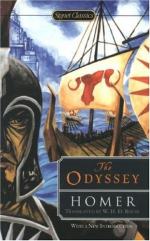“Those who maintain the Homeric poems to have been written from the beginning, rest their case, not upon positive proofs, nor yet upon the existing habits of society with regard to poetry—for they admit generally that the Iliad and Odyssey were not read, but recited and heard,—but upon the supposed necessity that there must have been manuscripts to ensure the preservation of the poems—the unassisted memory of reciters being neither sufficient nor trustworthy. But here we only escape a smaller difficulty by running into a greater; for the existence of trained bards, gifted with extraordinary memory, is far less astonishing than that of long manuscripts, in an age essentially non-reading and non-writing, and when even suitable instruments and materials for the process are not obvious. Moreover, there is a strong positive reason for believing that the bard was under no necessity of refreshing his memory by consulting a manuscript; for if such had been the fact, blindness would have been a disqualification for the profession, which we know that it was not, as well from the example of Demodokus, in the Odyssey, as from that of the blind bard of Chios, in the Hymn to the Delian Apollo, whom Thucydides, as well as the general tenor of Grecian legend, identifies with Homer himself. The author of that hymn, be he who he may, could never have described a blind man as attaining the utmost perfection in his art, if he had been conscious that the memory of the bard was only maintained by constant reference to the manuscript in his chest.”
The loss of the digamma, that crux of critics, that quicksand upon which even the acumen of Bentley was shipwrecked, seems to prove beyond a doubt, that the pronunciation of the Greek language had undergone a considerable change. Now it is certainly difficult to suppose that the Homeric poems could have suffered by this change, had written copies been preserved. If Chaucer’s poetry, for instance, had not been written, it could only have come down to us in a softened form, more like the effeminate version of Dryden, than the rough, quaint, noble original. “At what period,” continues Grote, “these poems, or indeed any other Greek poems, first began to be written, must be matter of conjecture, though there is ground for assurance that it was before the




